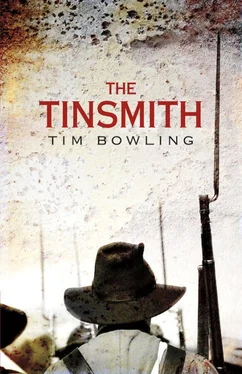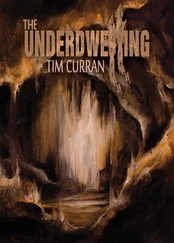The soldier was a hopeless case. Anson poured chloroform into a cloth and silenced the man’s screaming, then ordered the stretcher-man to get up off the ground and take the soldier to an ambulance. No response came. Anson began to upbraid the man for shirking when he noticed the trickle of blood over the eyelids. He crawled over and put his ear to the man’s chest. Nothing. Mercifully. Head wounds almost always proved mortal.
“Felix!”
The orderly scrambled over, swinging a pail like a censer. His long face chalked the air.
“I’ll be needed at the hospital,” Anson said. “You’ll have to handle this yourself. It’s quieter now.”
But even before the orderly responded, the artillery barrage began again and a shell screeched nearby, bursting and showering the hollow with dirt. Shouted exchanges could not be heard. The smoke clotted. Everything swam through it. For ten minutes, Anson crouched in the hollow, shaking. No wounded arrived. He wondered if all his stretcher-men were themselves killed or wounded—no doubt some had run off. Their absence decided him: he could do more good at the hospital. If only the artillery would let up. Several times he rose, prepared to sprint, but each lifting of his body seemed to trigger an even greater explosion. Again and again, he shrank back down.
At last, when adrenalin heaved him out of the hollow, he joined a stream of soldiers fleeing the fight.
“They’re through the corn!” a limping youth screamed into Anson’s face just as the artillery noises gave way to long rolls of musketry. “We can’t hold ’em!”
Anson paused. Men fell and rose all around him. The smoke looped in ropes and chains. Suddenly his choice took on a greater significance, became the cause itself. It seemed that his retreat, no matter how practical, was akin to leaving the field and the day to the rebels. And so, when a single soldier rushed past him toward the fight, Anson decided. He stopped and turned. A longhaired soldier clutching his side as if to hold it together shuffled along, his boots barely lifting off the ground. Anson realized that the man stood a better chance of survival if his wound was tended to immediately, and so, after a brief dumb show of explanation, he hoisted the soldier onto his back and staggered to the hollow.
By the time he reached it, the smoke had thinned and fewer men were emerging from the woodlot. It seemed the retreat had been halted. The wounded, however, continued to limp and crawl in, many with bloodied tourniquets of cornstalk on their shattered limbs. They begged for water or death, their faces blackened with powder. Anson read the requests in their eyes, on their lips. When he shook the last drop out of the last bottle of whisky, he resorted more and more to opium pills—and when those ran out, he relied on the faith of his parents, on their unswerving trust in the mercy of God.
Most of the stretcher-men had vanished, along with Felix. The wounded came under their own power or with the assistance of comrades. Anson recognized some soldiers from his regiment, but most were strangers. He didn’t know exactly when he’d noticed—perhaps by the fourth or fifth case—but he saw now that it had been this same tall, broad-shouldered young man in a uniform a size too small for him who’d been bringing the fallen over the crumbled lip of the hollow. Anson noted a curious lack of strain or panic on the soldier’s face, though perhaps he was only numb with fear. The right cheek showed a large, rough wound, as if the skin had been scraped with a knife, but otherwise the young soldier appeared unharmed. He did not hide the wound, but he had a pronounced habit of ducking his head as soon as scrutiny lasted more than a few seconds, an action that seemed modest rather than devious.
But Anson looked at this man’s face often enough over the next frantic hours that its features became vividly fixed in his memory: large, slightly bulbous eyes, a full, wet mouth, the bottom lip jutting out a little, and pale skin that yet had a curious dark cast to it, much the way that the moon, Anson thought, no matter how bright, always suggests the presence of darkness. Regardless of that impression, which did not so much unnerve as intrigue Anson, the youth’s grace was striking. With surprising ease, he carried his wounded comrades either slung over his shoulders or cradled in his arms—and when he placed them down, his care was most evident. His expression, tight with exertion, never altered. Nor did he attempt to communicate. There was an odd deference to his behaviour that reminded Anson of something he’d seen before, and recently, but he could not place it. The youth, waiting for Anson to dictate by a nod of the head where he should lay the latest wounded man down, suddenly gave an involuntary shudder under the intensity of Anson’s gaze and ducked his head. Then, placing the soldier gently on the ground, he raced back into the smoke and fire flashes, without even a rifle for protection.
Caught up again in his duties, Anson forgot about the tall soldier. The noise and smoke continued unabated, with troops rushing forward in columns and falling back again in bloodied fragments, the frantic motion accompanied by sporadic cheers and the terrifying peals of the rebels’ yelling. Several times, the yells cut so sharply through the din that Anson expected a grey wave bearing faces fierce with the lust to kill to roll over him. But always the yells faded, the grey wave broke elsewhere, and the tall, calm, long-limbed soldier brought in another fallen comrade.
Some men, Anson knew from previous battles, shirked a more dangerous duty by helping the wounded—fit soldiers who accompanied the fallen out of the fight often found reasons not to return, or at the very least they returned as slowly as possible. This tall soldier, however, always rushed back to the lines with his fighting blood fully up. Perhaps he killed rebels with his bare hands. He appeared capable enough; his hands dangled thick and knot-tight at his sides. And by nine o’clock, during another strange lull in the battle, Anson knew that this fight was terrible, often a hand-to-hand affair. One soldier said that he lay on the ground beneath the powder smoke and shot at the legs of rebels as they passed a few feet in front of him. So perhaps the tall soldier did kill without a rifle. And yet, there was that faintly familiar humility, that long shudder, as if he’d been caught doing something wrong. Anson couldn’t dismiss it entirely. He kept expecting to see the shudder again.
Oddly enough, however, once the shooting and shelling had stopped over the broken landscape and the cries of the wounded for water echoed dismally through the woods and across the pasture fields and orchards, the tall soldier had vanished.
Anson gathered the remainder of his supplies into his kit and stepped out of the hollow. The trees in the near woodlot were smoking, splintered sticks through which a staggering figure sometimes emerged. The ground flowed with torn smoke. A wounded horse neighed miserably as it kicked two legs at the sky. The cry of “Water! Water!” never stopped. Blue shadows crawled like flies toward the rear, some grey shadows among them. Most of the tall stalks of a vast cornfield nearby were gone, the stubs scorched black, the few leaves spattered with blood.
After helping to load some wounded onto a wagon, Anson left orders for the other ambulance-men regarding where to concentrate their efforts, then trudged for a half-mile under the risen sun to his bloodier labours at a barnyard northwest of the hollow. It was a strange, disorienting journey, with every twenty paces over the shelled earth bringing a new assault on the senses. Passing an orchard of broken-limbed trees, Anson suddenly breathed in the powerful aroma of ripe peaches. But just as he was enjoying the experience, the peach scent faded, replaced by the foul stench of death rising off a mangled horse. Twenty paces on, close to a trim little farmhouse, several swarms of bees poured like smoke out of a cluster of wooden box hives. Everywhere the collision of nature and war struck Anson with a gloom that made his steps feel more weighted down than usual.
Читать дальше












